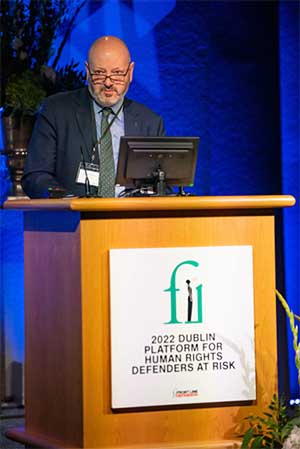Summary:
-
The first Dublin Platform for Human Rights Defenders was held in January 2002, a little over 20 years ago.
-
For the first time in 2021, we gave more than a thousand grants to human rights advocates in 105 different countries.
-
This project collects information on the cases of human rights defenders who are targeted and killed because of their work on behalf of human rights.
-
Following this, we collaborated with the Irish Department of Foreign Affairs to build a monument honouring human rights defenders in Dublin.
-
In particular, I want to draw attention to Abdulhadi Al-Khawaja, a friend and former workmate who was kidnapped, tortured, and given a life sentence in jail for over 11 years following a mock trial.
They are terrified of us because we are not afraid of them, Berta Cáceres, a Lenca Indigenous woman and human rights advocate, remarked before she was assassinated in Honduras in 2016.
The fact that autocrats, bigots, and influential economic interests continue to devote a large amount of money to try to intimidate them or obstruct their work speaks volumes about the success of human rights defenders worldwide.
The oppressors’ actions are a tribute to the bravery, tenacity, and significance of human rights defenders. They involve sophisticated surveillance, brutal violence, costly smear campaigns, significant time and effort from security services and police forces, ongoing judicial proceedings, and new restrictive laws.
In reality, communities continue to rally around a battle framed in rights in numerous countries across all regions. In contrast, human rights academics dispute the relevance of a weak UN system.
“Freedom, peace, and justice” served as the unifying theme of the Sudanese revolution, whereas the Iranian protesters adopted the phrase “women, life, freedom.” There won’t be a solution to the climate issue without protecting indigenous territory and rights because we are a vital component of that solution, according to Sonia Guajajara, President of the Articulation of Indigenous Peoples of Brazil (ABIP), who made this statement at the UN Climate Conference.
We are all inspired by the human rights advocates with whom we collaborate daily at Front Line Defenders.
Even though she has the choice to be with her family outside of Afghanistan under the horrific Taliban government, Liah Ghazanfar Jawad continues to fight to support women and women’s rights there.

In front of a crowded conference room in Dublin, Ireland, last week, artist and human rights advocate Diana Berg declared: “Until I get assassinated by a Russian Iranian drone, I will help survivors deport teenagers and evacuate museums.”
The first Dublin Platform for Human Rights Defenders was held in January 2002, a little over 20 years ago. The organisation would be guided by the requirements voiced by human rights defenders themselves, according to our visionary founder Mary Lawlor, who is currently the UN Special Rapporteur on Human Rights Defenders. Over 100 human rights defenders attended the Front Line Defenders launch, thanks in large part to the efforts of her small team.
Twenty years later, the organization’s primary focus is still on providing prompt and valuable help to protect human rights activists on a global scale. For the first time in 2021, we gave more than a thousand grants to human rights advocates in 105 different countries.
We are devoted to the fight. Our work is based on deep regard for human rights advocates—for the good they do, the courage they show, and the wisdom they possess. They have our backing, and we will do everything we can to stand with them.
We gathered over 100 at-risk human rights advocates from dozens of nations for three days at the just concluded 11th Dublin Platform in the fabled Dublin Castle. We talked about various topics, including how authoritarian governments attack human rights advocates using anti-terrorism and security laws, the pushback against feminists and LGBTIQ+ advocates, and the function of human rights advocates in the context of demonstrations and social movements.
We were conscious of the human rights activists who were not present when we convened in Dublin. To demonstrate the scope of the issue, highlight the systematic nature of these attacks, and create a space for remembrance, we assisted in establishing the HRD Memorial Project in 2016. This project collects information on the cases of human rights defenders who are targeted and killed because of their work on behalf of human rights.
Following this, we collaborated with the Irish Department of Foreign Affairs to build a monument honouring human rights defenders in Dublin. This location is where we recently held a sombre candlelight vigil to remember the numerous human rights defenders who have died while doing their nonviolent work.
We would have liked to welcome many human rights advocates to Dublin, but their governments forbade them from doing so. Narges Mohammadi in Iran, Dawit Isaac in Eritrea, Maria Rabkova in Belarus, Trn Hunh Duy Thc in Vietnam, Pablo López Alavez in Mexico, and Ilham Tohti in China are only a few examples of long-term detainees who are fighting for human rights.
In particular, I want to draw attention to Abdulhadi Al-Khawaja, a friend and former workmate who was kidnapped, tortured, and given a life sentence in jail for over 11 years following a mock trial. We continue to advocate for the release of all detained human rights advocates, including Abdulhadi.
Atena Daemi, an Iranian human rights activist who was also unable to join us in Dublin due to the country’s continuing protests, provided a provocative statement about what keeps her going through difficult times: “Humanity is our shared love and battle. Every one of us strives to uphold human rights. It is the pinnacle of human happiness, freedom, and joy.
Such steadfastness of purpose inspires us at Front Line Defenders to keep defending the rights of human beings around the world and joining them in the fight against injustice.
Analysis by: Advocacy Unified Network

